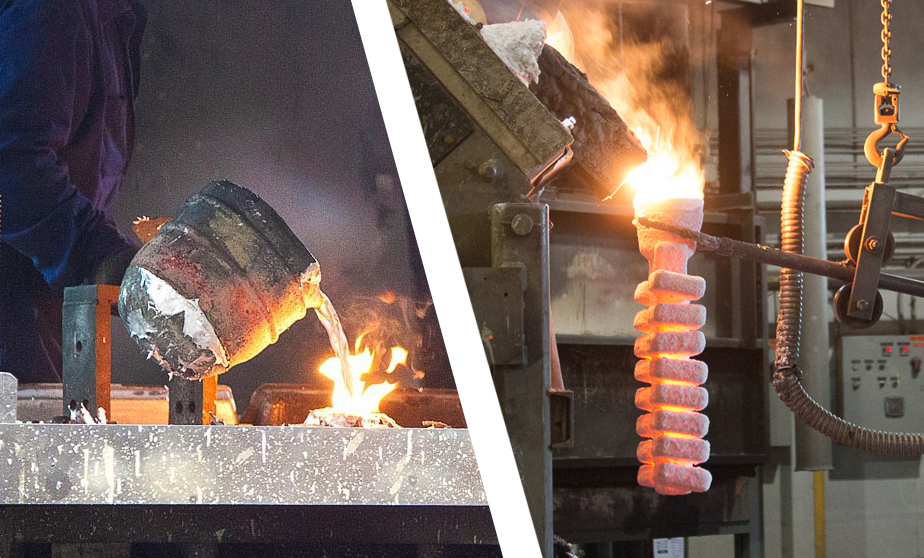Not known Facts About Stahl Specialty Company
Table of ContentsSome Known Details About Stahl Specialty Company Excitement About Stahl Specialty CompanyThe Single Strategy To Use For Stahl Specialty CompanyThe 8-Minute Rule for Stahl Specialty CompanyThe Buzz on Stahl Specialty Company
The refined difference depends on the chemical web content. Chemical Contrast of Cast Light weight aluminum Alloys Silicon advertises castability by decreasing the alloy's melting temperature and improving fluidity during spreading. It plays an essential function in allowing intricate molds to be filled up precisely. Additionally, silicon contributes to the alloy's strength and use resistance, making it useful in applications where sturdiness is vital, such as vehicle components and engine parts.It also boosts the machinability of the alloy, making it simpler to refine into finished items. By doing this, iron adds to the total workability of light weight aluminum alloys. Copper enhances electric conductivity, making it advantageous in electrical applications. It also boosts rust resistance and contributes to the alloy's general toughness.
Manganese contributes to the stamina of light weight aluminum alloys and enhances workability. Magnesium is a lightweight aspect that offers strength and effect resistance to aluminum alloys.
It permits the manufacturing of lightweight components with exceptional mechanical properties. Zinc improves the castability of light weight aluminum alloys and aids control the solidification process throughout spreading. It boosts the alloy's toughness and solidity. It is commonly found in applications where intricate shapes and great details are required, such as ornamental spreadings and specific auto components.
The Single Strategy To Use For Stahl Specialty Company
Due to the fact that aluminum-silicon alloys have great spreading residential or commercial properties, high gas residential properties, straightforward procedures, and exceptional deterioration resistance, aluminum-silicon alloys are most typically made use of in the die-casting industry at home and abroad. At the same time, aluminum-silicon alloys are additionally relatively very early and commonly recognized alloys created and used in die-casting. After continuous research and improvement, a lot of the existing global mainstream aluminum-silicon alloys have actually been settled and are nothing even more than A356, A360, A380, ADC12, B390, and A413.
The main thermal conductivity, tensile stamina, yield stamina, and prolongation vary. Amongst the above alloys, A356 has the greatest thermal conductivity, and A380 and ADC12 have the lowest.

The Only Guide for Stahl Specialty Company
In precision casting, 6063 is fit for applications where detailed geometries and top notch surface area coatings are critical. Instances include telecommunication enclosures, where the alloy's remarkable formability allows for streamlined and visually pleasing styles while maintaining architectural stability. In the Lighting Solutions market, precision-cast 6063 elements develop sophisticated and reliable lighting fixtures that call for elaborate forms and great thermal efficiency.
(https://www.domestika.org/en/stahlspecialc)
It leads to a better surface finish and better corrosion resistance in A360. Additionally, the A360 exhibits remarkable prolongation, making it excellent for complex and thin-walled parts. In precision spreading applications, A360 is well-suited for markets such as Consumer Electronics, Telecommunication, and Power Devices. aluminum metal casting. Its enhanced fluidness enables elaborate, high-precision components like smartphone housings and communication gadget real estates.

In accuracy casting, light weight aluminum 413 shines in the Customer Electronic Devices and Power Equipment sectors. This alloy's exceptional deterioration resistance makes it an outstanding selection for outdoor applications, ensuring resilient, durable products read this post here in the discussed sectors.
Facts About Stahl Specialty Company Revealed
As soon as you have determined that the light weight aluminum die casting process appropriates for your task, a crucial next step is selecting the most proper alloy. The aluminum alloy you choose will substantially impact both the casting procedure and the residential or commercial properties of the final product. As a result of this, you must make your choice thoroughly and take an educated strategy.
Establishing the most appropriate aluminum alloy for your application will certainly indicate weighing a broad selection of features. The first group addresses alloy qualities that impact the production procedure.
The alloy you choose for die spreading directly impacts several aspects of the spreading procedure, like how easy the alloy is to function with and if it is susceptible to casting issues. Warm splitting, also called solidification cracking, is a regular die spreading issue for light weight aluminum alloys that can lead to inner or surface-level rips or cracks.
Some Of Stahl Specialty Company
Particular light weight aluminum alloys are a lot more vulnerable to hot cracking than others, and your choice needs to consider this. An additional typical flaw discovered in the die spreading of aluminum is pass away soldering, which is when the actors sticks to the die walls and makes ejection difficult. It can harm both the cast and the die, so you should look for alloys with high anti-soldering residential or commercial properties.
Deterioration resistance, which is currently a significant characteristic of aluminum, can vary considerably from alloy to alloy and is an essential particular to take into consideration depending on the environmental conditions your item will be exposed to. Put on resistance is another residential or commercial property commonly looked for in aluminum items and can set apart some alloys.